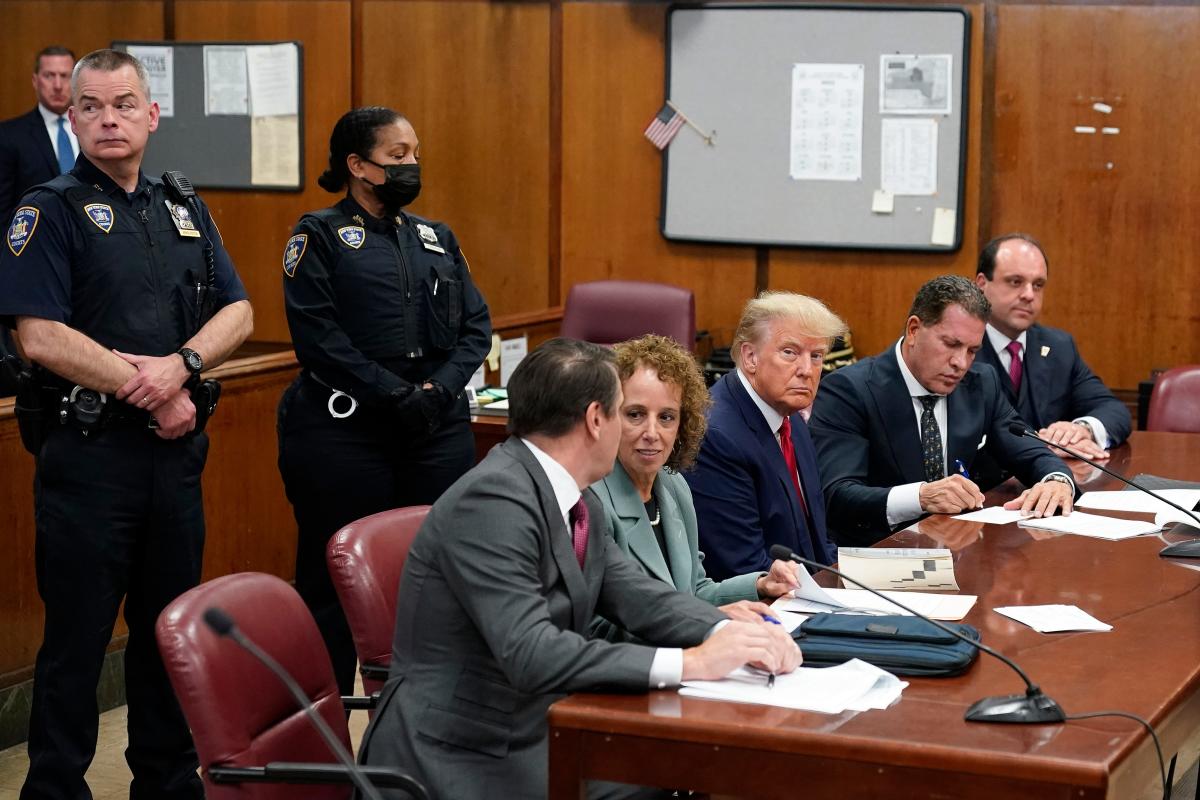Trump Conferences
Donald Trump’s conferences have been a significant part of his political career, evolving from boisterous rallies to more polished events. They have served as platforms for promoting his political agenda, engaging with supporters, and shaping public opinion. This exploration delves into the historical trajectory of Trump’s conferences, examining their evolution, thematic shifts, and influence on his political journey.
Early Rallies and Their Impact
Trump’s political career began with his foray into reality television, culminating in his decision to run for president in 2016. His early rallies, characterized by their energetic and often confrontational nature, played a crucial role in galvanizing his base and capturing media attention. These rallies, often held in large venues like stadiums and arenas, were marked by fervent crowds, chants, and Trump’s signature brand of populist rhetoric. The energy and passion of these early gatherings contributed significantly to his success in the Republican primaries.
The Audience and Purpose of Trump Conferences
Trump conferences, gatherings organized by former President Donald Trump, attract a specific audience with distinct motivations and expectations. These events serve a strategic purpose for both Trump and his supporters, offering a platform for communication, mobilization, and the reinforcement of shared beliefs.
The Demographics of Trump Conference Attendees
Trump conferences typically draw a diverse audience, although certain demographic groups are overrepresented. According to surveys and anecdotal evidence, the attendees often include:
- White, non-Hispanic Americans: This group constitutes a significant portion of Trump’s base, reflecting his strong appeal to certain segments of the white working class and rural communities.
- Older Americans: Trump enjoys considerable support among older voters, who may be drawn to his policies on social security, Medicare, and other issues affecting their generation.
- Evangelical Christians: Trump’s conservative stance on social issues, including abortion and same-sex marriage, resonates with many evangelical voters, who are a significant voting bloc in the United States.
- Individuals with lower levels of education: Studies have shown that Trump’s appeal is stronger among voters with less formal education, who may be more susceptible to his populist rhetoric and anti-establishment message.
- Residents of rural areas: Trump’s campaign focused heavily on rural communities, and his policies on trade, immigration, and energy production have resonated with many voters in these areas.
It’s important to note that this demographic profile is not monolithic. Trump conferences attract individuals from various backgrounds and political affiliations, reflecting the complexity of his support base.
Motivations and Expectations of Attendees
Trump conference attendees are motivated by a range of factors, including:
- Support for Trump’s policies: Many attendees strongly agree with Trump’s positions on issues like immigration, trade, and national security. They view these conferences as opportunities to demonstrate their support and hear him speak directly about his agenda.
- Desire for change: Trump’s campaign promised to “drain the swamp” and bring about significant change in Washington, D.C. His supporters often see these conferences as a way to stay informed about his efforts to fulfill those promises and to show their continued commitment to his movement.
- Shared values and beliefs: Trump conferences create a sense of community among like-minded individuals who share similar values and beliefs. Attendees often report feeling a sense of belonging and empowerment when they gather with others who support Trump and his vision for America.
- Desire to be part of something bigger: Trump’s supporters often express a desire to be part of a movement that is changing the course of American politics. These conferences provide a platform for them to connect with other supporters and feel like they are contributing to a larger cause.
Strategic Purpose of Trump Conferences
Trump conferences serve several strategic purposes for both Trump and his supporters:
- Maintaining a base of support: These events provide a platform for Trump to connect directly with his supporters, reinforce his message, and mobilize them for future political action.
- Fundraising: Trump conferences often involve fundraising efforts, allowing him to generate financial resources for his political activities and organizations.
- Promoting his brand: Trump conferences are a way for him to maintain his presence in the public sphere and promote his brand, even after leaving office.
- Testing the waters: These conferences can serve as a way for Trump to gauge the level of support he retains and to test the waters for a potential future political campaign.
- Building a movement: Trump conferences contribute to building a sense of collective identity among his supporters, fostering a movement that extends beyond traditional political boundaries.
These conferences represent a key element of Trump’s continued political activity and engagement, demonstrating his ongoing influence on the Republican Party and American politics.
Key Themes and Messages at Trump Conferences

Trump conferences are characterized by a consistent set of themes and messages that resonate with his base and often serve as rallying cries for his supporters. These themes are woven into his speeches and those of his allies, creating a cohesive narrative that reinforces his political ideology and targets his perceived opponents.
Political Issues, Trump conference
Trump conferences often focus on political issues that are central to his agenda, emphasizing his conservative stance and promoting his “America First” policies.
- Immigration: Trump frequently frames immigration as a threat to national security and economic prosperity, advocating for stricter border controls and a reduction in legal immigration. He often uses inflammatory language to describe immigrants, particularly those from Latin America, and has repeatedly called for a wall along the U.S.-Mexico border.
- Trade: Trump frequently criticizes trade deals that he believes have been detrimental to American workers, arguing that they have led to job losses and a decline in manufacturing. He has imposed tariffs on goods from China and other countries, arguing that these measures are necessary to protect American jobs and industries.
- Foreign Policy: Trump’s foreign policy rhetoric often emphasizes a “tough on terrorism” approach, advocating for a more assertive stance towards adversaries like Iran and North Korea. He has withdrawn the U.S. from international agreements such as the Paris Climate Accord and the Iran nuclear deal, arguing that these agreements are unfavorable to American interests.
Economic Concerns
Trump conferences often address economic concerns, portraying himself as a champion of the working class and promising to bring back jobs and improve the economy.
- Jobs and the Economy: Trump frequently boasts about the strong economy during his presidency, attributing the growth to his policies, including tax cuts and deregulation. He often targets specific industries, such as manufacturing, and promises to bring back jobs that have been lost to overseas competition.
- Trade Deficits: Trump frequently blames trade deficits for job losses and economic hardship, arguing that the U.S. is being taken advantage of by other countries. He has imposed tariffs on goods from China and other countries, arguing that these measures are necessary to reduce trade deficits and protect American jobs.
- Energy Independence: Trump has promoted policies aimed at increasing American energy production, particularly oil and gas, arguing that this will create jobs and reduce dependence on foreign energy sources. He has rolled back environmental regulations, arguing that these regulations are too burdensome and stifle economic growth.
Cultural Anxieties
Trump conferences often tap into cultural anxieties, portraying himself as a defender of traditional values and American identity.
- “Make America Great Again”: Trump’s signature slogan, “Make America Great Again,” evokes a sense of nostalgia for a bygone era, often associated with white, Christian America. He frequently references a perceived decline in American values and culture, suggesting that the country is losing its identity.
- Social Issues: Trump has often taken a conservative stance on social issues such as abortion and LGBTQ+ rights, aligning himself with traditional values and appealing to a conservative base. He has appointed conservative judges to the Supreme Court, suggesting that he will continue to advance these values.
- Political Correctness: Trump frequently criticizes what he perceives as excessive political correctness, arguing that it stifles free speech and hinders the expression of traditional values. He often uses inflammatory language and makes controversial statements, arguing that he is not afraid to speak his mind.
Personal Attacks on Opponents
Trump conferences are often characterized by personal attacks on his opponents, using derogatory language and accusations to discredit them and undermine their credibility.
- “Fake News”: Trump frequently accuses the media of being biased against him and spreading “fake news,” attempting to delegitimize critical coverage and portray himself as a victim of unfair treatment. He often singles out specific journalists and news outlets for criticism, arguing that they are part of a “deep state” conspiracy against him.
- Personal Attacks on Opponents: Trump often uses personal attacks to discredit his opponents, targeting their character, intelligence, and abilities. He has used derogatory language to describe his political rivals, including former President Barack Obama and Democratic presidential nominee Joe Biden, and has made unfounded accusations of corruption and wrongdoing.
- Conspiracy Theories: Trump has frequently promoted conspiracy theories, including the belief that the 2020 presidential election was stolen from him. He has used these theories to fuel distrust in democratic institutions and to undermine the legitimacy of his opponents.
Trump conferences are often seen as gatherings of passionate supporters, a platform for sharing ideas and rallying behind a common vision. The location of these conferences, such as the luxurious Trump Mar-a-Lago , often adds to the mystique and spectacle.
These gatherings, whether held at a resort or in a more traditional setting, serve as a reminder of the power of community and the importance of shared goals.
The Trump conference, though a subject of much debate, can be seen as a microcosm of the complexities of leadership. It mirrors the challenges faced by leaders like Ethiopia’s Girma, who navigated a turbulent era of change and growth, leaving a legacy of leadership you can read about here.
The conference, in its own way, offers a platform for discussion and debate, fostering a dialogue that can shape future decisions and inspire new approaches to leadership.

